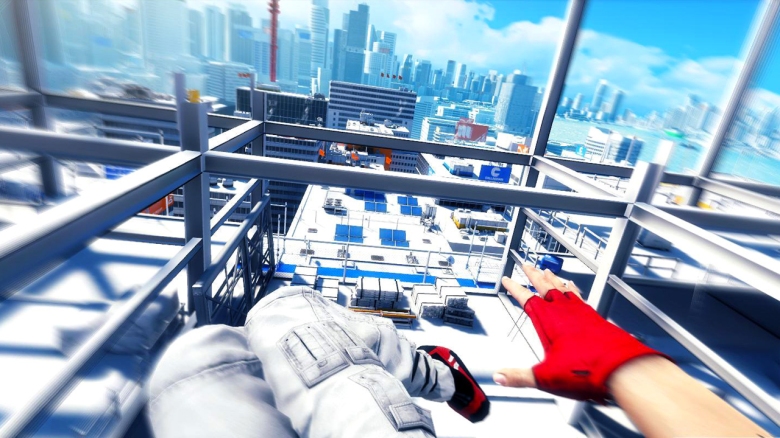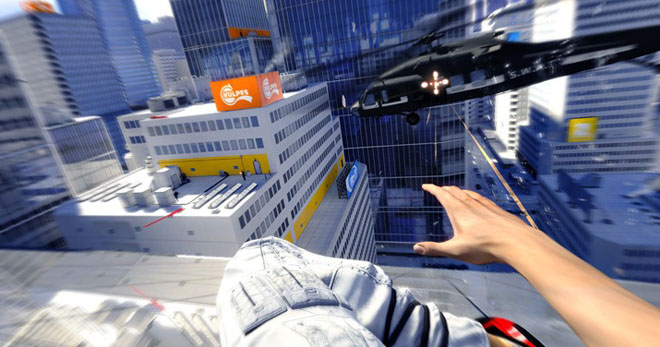
Genre: Action-Adventure, Platformer
Year: 2008
Developed by: DICE
Published by: Electronic Arts
Platforms: PS3, XBOX 360, PC
#93
Feeling Like: Catching my breath
Unlike Heavy Rain, Mirror’s Edge is as uncomplicated as you can get. It’s lean, it’s mean and it’s magnificent. It’s so rare games focus on one thing, but when you do it as well as DICE did, you can get away with it. Mirror’s Edge is about as clean and thrilling a six hour experience can be. There’s no fat on this steak, no time for it to overstay its welcome. Whenever I think of it, I smile and immediately want to go for a jog.
It’s all about running.
It’s about the most common, basic mechanic in gaming. Moving. How exciting can that be? You barely have any weapons or powers, you can’t fly, you can’t repel bullets, you can’t take on dozens of enemies at once. You’re not a super hero – hell, you’re a courier! You take packages from one place to another. But the simplicity is part of the beauty. The sleek aesthetic is nearly blinding, it’s unforgettable. No city looks as clean as this, but that’s why we play video games, isn’t it? To experience something incredible.

In a first person view, you run. And jump, and slide, and climb. That’s about it. Normally platforming perils outside a third person view can be insultingly difficult, but not so here. The brilliance of the design means that points of interest, or platforms the game is guiding you to are clearly marked by a splash of color. It could be a red zipline, or a blue sign, or a yellow strip of paint. There aren’t any shiny arrows pointing you where to go, but there may as well be.
And you know what? That’s fine. When you’re hurtling across rooftops and sprinting through hallways to avoid enemies, your brain only has a split second to register something different. The focus on parkour means that every strip of city becomes a potential playground, and the desire to master a route is heightened by how great everything feels.

I couldn’t help but feel like Trinity running from the Agents. With the music pumping, you gallop along a fire escape before launching yourself into the air, landing with a tuck and roll before scanning the new landscape for an exit. You see a door, burst it open as you hear gunfire erupt behind you. Ok, where to go, where to go, jump up there! Run! Run! Run!
The motion blurring on the edges of the screen, along with Faith’s labored breathing really makes you feel like you’re running for your life. It’s amazing, so few games capture this type of rush. It’s all about starting up and keeping your momentum, so much so that slowing down or stopping feels like a Game Over, even if it isn’t. Mirror’s Edge isn’t a racing game, but it certainly has a toe in that bucket.
I did an entry for Snackbar about speed in games, and it seems appropriate to post here.
We’re living in the fastest time in human history. Our population is growing exponentially faster than ever before. Computers are making greater advances in weeks than they previously did in decades. Every site is racing to bring you information faster, and nobody is satisfied with a less than a lightning-quick Internet connection.
We need our modern consoles to be able to process graphics and audio at levels unheard of in years past. Lag has to be nonexistent, the frame rate can never drop below 30 frames per second, and loading screens must be kept short in order for us to fully enjoy what today’s entertainment can bring us.
But what does speed mean in games?
When Sega was going toe-to-toe with Nintendo, it was everything. Speed was its primary marketing message; Sega’s games are faster than Nintendo’s. Compared to Mario games, Sonic was in a different galaxy. Levels blurred by as you sped through mazes, trees and loop-de-loops as you maneuvered the lovable blue animal to the end and defeat the evil Dr. Robotnik. So yeah, speed’s important.
Some of my favorite games were built on the notion that we are slow human beings, but we want to go fast. Really fast. Impossibly fast. I don’t even want to see what I’m passing by; I want my competition to eat my dust and choke on it when I come around again. I want to feel superior in a way that I’ll never be in real life. I want to feel the flow of the wind and the seeming helplessness from the enemies who can’t keep up.
Mirror’s Edge is a first-person… action-adventure? Platformer? Shooter? It dips its hands into many genres. You play as Faith Connors, a “runner” who earns a living as a courier of messages and items between parties who wish to remain unseen. The dystopian city you play in veers away from the post-apocalyptic, futuristic settings we often see when we hear about an oppressive government. The city is absolutely gorgeous, and the game has one of the cleanest, most appealing aesthetics I’ve ever seen.

The outside areas looks polished. You want your rooftops to look like this; everything has a fresh coat of silver paint, with the odd blue, yellow and red objects thrown in to guide the player. You’ll often get distracted simply by taking in the backdrop skyline, which looks futuristic enough to be interesting, but not so outlandish that you don’t believe it could never exist. It’s sunny, with peaceful clouds providing more opportunities for the bloom lighting to brighten your route.
The gameplay doesn’t sound like anything special: you control Faith as she runs from one level to the other. Big deal. But the brilliance lies within the subtle design choices. When you start to run, you hear Faith’s breathing increase in rapidity and volume. A slight visual effect changes your view, giving the indication that you are really sprinting across the rooftops. Every time you jump, or duck, or roll, or run alongside a wall, you really feel like you’re running too.
There are enemies, of course. Sadly, the limited gunplay is one of the least interesting aspects of the game. True masters will beat each level without using a single weapon. The best parts of Mirror’s Edge will come from you having to control Faith through rooftops, hallways, office buildings and the underground while being shot at by soldiers and helicopters. There’s an indescribable thrill when sprinting across a narrow plank, slamming into a doorway, running for my life while hearing the windows next to me explode in a hailstorm of bullets, sliding under a desk before reaching an elevator and being rewarded with a temporary reprieve. I’ve never seen a game emulate Trinity running from the Agents in The Matrix like this. It’s all about speed in Mirror’s Edge; from the constant threat of enemy gunfire to the more peaceful time trials, it rewards players who think creatively, keep their momentum going and go as fast as possible.
It’s a shame the sequel didn’t turn out as well as the first, I heard they strayed too far from what made the original work. Maybe this is the type of experience that’s best left short. Brevity is the soul of wit, they say. I could take a lesson from that.
I’ll end the post with some of my favorite tracks from the game. They’re more ambient than most of the soundtracks I’m drawn to, but they fit Mirror’s Edge perfectly.
